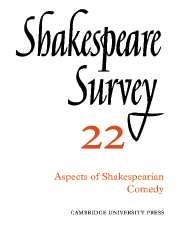Book contents
- Frontmatter
- Old and New Comedy
- An Approach to Shakespearian Comedy
- Shakespeare, Molière, and the Comedy of Ambiguity
- Comic Structure and Tonal Manipulation in Shakespeare and Some Modern Plays
- Laughing with the Audience: ‘The Two Gentlemen of Verona’ and the Popular Tradition
- Shakespearian and Jonsonian Comedy
- Two Magian Comedies: ‘The Tempest’ and ‘The Alchemist’
- ‘Thou that beget’st him that did thee beget’: Transformation in ‘Pericles’ and ‘The Winter’s Tale’
- The Words of Mercury
- Why Does it End Well? Helena, Bertram, and The Sonnets
- Some Dramatic Techniques in ‘The Winter’s Tale’
- Clemency, Will, and Just Cause in ‘Julius Caesar’
- Thomas Bull and other ‘English Instrumentalists’ in Denmark in the 1580s
- Shakespeare in the Early Sydney Theatre
- The Reason Why: The Royal Shakespeare Season 1968
- The Year's Contributions to Shakespearian Study 1 Critical Studies
- 2 Shakespeare’s Life, Times and Stage
- 3 Textual Studies
- Index
- Plate Section
The Words of Mercury
Published online by Cambridge University Press: 28 March 2007
- Frontmatter
- Old and New Comedy
- An Approach to Shakespearian Comedy
- Shakespeare, Molière, and the Comedy of Ambiguity
- Comic Structure and Tonal Manipulation in Shakespeare and Some Modern Plays
- Laughing with the Audience: ‘The Two Gentlemen of Verona’ and the Popular Tradition
- Shakespearian and Jonsonian Comedy
- Two Magian Comedies: ‘The Tempest’ and ‘The Alchemist’
- ‘Thou that beget’st him that did thee beget’: Transformation in ‘Pericles’ and ‘The Winter’s Tale’
- The Words of Mercury
- Why Does it End Well? Helena, Bertram, and The Sonnets
- Some Dramatic Techniques in ‘The Winter’s Tale’
- Clemency, Will, and Just Cause in ‘Julius Caesar’
- Thomas Bull and other ‘English Instrumentalists’ in Denmark in the 1580s
- Shakespeare in the Early Sydney Theatre
- The Reason Why: The Royal Shakespeare Season 1968
- The Year's Contributions to Shakespearian Study 1 Critical Studies
- 2 Shakespeare’s Life, Times and Stage
- 3 Textual Studies
- Index
- Plate Section
Summary
Love’s Labour’s Lost is probably better appreciated today than at any time since its earliest performances. It is now found to play well, it has had some extremely understanding criticism over the last two decades. Nowadays critics have slackened their efforts to expound the play as a sophisticated in-joke, a spoof on Lyly and on the School of Night. No doubt it is all that, but the concentration on the topical interest of Love’s Labour’s Lost tended to obscure its permanent value. The play retains its elusiveness, but is today generally regarded as a delicate and controlled movement towards an acceptance of reality. ‘Reality’ is a term that (however unsatisfactory philosophically) critics agree upon as a convenient designation for the target of the play’s probing. The word is not susceptible to exact definition, but it designates all those phenomena of life that are symbolized by the entry of Mercade. That entry is the key fact of the play: it is hardly possible to sustain the argument that it is ‘sudden, unprovided for, external to the inner necessity of the plot, and for that reason aesthetically unsatisfactory, though theatrically effective’. For the play has opened with an assault upon Time/Death (lines 1–14), as it closes with the acknowledgement of Time’s victory. The death-message is organically present in Scene ⅰ, as certain cells die shortly after the body’s birth. And the final Act makes sense only as a reversal of the first Act: the themes of light-darkness, folly-wisdom, fantasy-reality are initiated and resolved in the exposition and conclusion.
- Type
- Chapter
- Information
- Shakespeare Survey , pp. 69 - 78Publisher: Cambridge University PressPrint publication year: 1970
- 1
- Cited by



